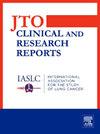Predictive Factors for Smoking Cessation Among People With Lung Cancer Attending French Cessation Services, According to Sex
IF 3.5
Q2 ONCOLOGY
引用次数: 0
Abstract
Background
Limited research exists on sex-specific smoking cessation interventions for patients with lung cancer. This study leverages data from the Consultations de Dépendance Tabagique, the French national database of smoking cessation services (SCS), to identify sex-specific factors influencing smoking cessation in people with lung cancer.
Methods
This retrospective observational study analyzed data from 3407 adults with lung cancer (31.2% women, 68.8% men) registered in the Consultations de Dépendance Tabagique between 2001 and 2018. Participants were people with active tobacco use with at least one follow-up SCS consultation. The primary outcome was 28-day smoking abstinence, confirmed by exhaled carbon monoxide less than 10 parts per million. Multivariate logistic regression identified predictors of abstinence, stratified by sex.
Results
Abstinence rates were similar in women (35.2%) and men (35.4%) (p = 0.40). Women had higher psychological distress (19.8% with depression versus 13.1% in men; p < 0.001) and were more likely to seek SCS independently (19.4% versus 13.6%; p < 0.001). Men smoked more cigarettes daily (27 versus 25; p = 0.002) and had higher alcohol consumption (35.7% versus 13.9%; p < 0.001). Confidence in quitting (women: odds ratio [OR] = 1.91; 95% confidence interval [CI]: 1.27–2.87; men: OR = 1.50; 95% CI: 1.16–1.95) and follow-up consultations (≥7: women: OR = 8.86; 95% CI: 5.69–14.0; men: OR = 6.64; 95% CI: 4.88–9.13) predicted abstinence for both sexes. Among women, hospital referral (OR = 1.63; 95% CI: 1.10–2.43) and living with other persons who smoke (OR = 4.16; 95% CI: 1.70–10.4) increased abstinence, whereas in men, nicotine replacement therapy (OR = 1.46; 95% CI: 1.09–1.97) was beneficial.
Conclusions
The results indicate a need for further research into targeted interventions by sex to evaluate the efficacy of smoking cessation strategies in patients with lung cancer.
参加法国戒烟服务的肺癌患者戒烟的预测因素,按性别分列
背景针对肺癌患者的性别戒烟干预措施的研究有限。这项研究利用了法国国家戒烟服务数据库(SCS)的数据,以确定影响肺癌患者戒烟的性别特异性因素。方法本回顾性观察性研究分析了2001年至2018年在Tabagique咨询中心登记的3407名成年肺癌患者(31.2%为女性,68.8%为男性)的数据。参与者是积极吸烟的人,至少有一次随访的SCS咨询。主要结果是戒烟28天,通过呼出的一氧化碳低于百万分之十来证实。多变量逻辑回归确定了禁欲的预测因素,按性别分层。结果女性(35.2%)和男性(35.4%)的戒断率相近(p = 0.40)。女性有更高的心理困扰(19.8%患有抑郁症,男性为13.1%;p < 0.001),并且更有可能独立寻求SCS(19.4%对13.6%;p < 0.001)。男性每天吸烟较多(27比25;p = 0.002),饮酒较多(35.7%比13.9%;p < 0.001)。戒烟的置信度(女性:优势比[OR] = 1.91; 95%可信区间[CI]: 1.27-2.87;男性:OR = 1.50; 95% CI: 1.16-1.95)和随访咨询(≥7:女性:OR = 8.86; 95% CI: 5.69-14.0;男性:OR = 6.64; 95% CI: 4.88-9.13)预测两性的戒断。在女性中,医院转诊(OR = 1.63; 95% CI: 1.10-2.43)和与其他吸烟者一起生活(OR = 4.16; 95% CI: 1.70-10.4)增加了戒断,而在男性中,尼古丁替代疗法(OR = 1.46; 95% CI: 1.09-1.97)是有益的。结论有必要进一步开展针对性干预研究,以评估肺癌患者戒烟策略的疗效。
本文章由计算机程序翻译,如有差异,请以英文原文为准。
求助全文
约1分钟内获得全文
求助全文
来源期刊

JTO Clinical and Research Reports
Medicine-Oncology
CiteScore
4.20
自引率
0.00%
发文量
145
审稿时长
19 weeks
 求助内容:
求助内容: 应助结果提醒方式:
应助结果提醒方式:


